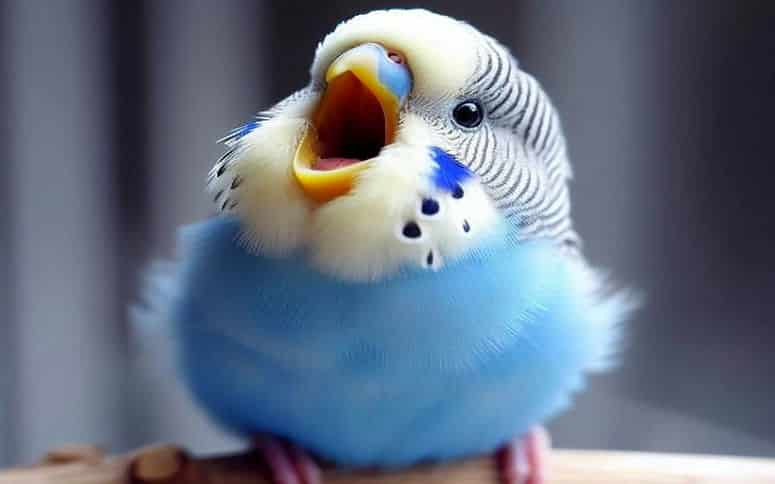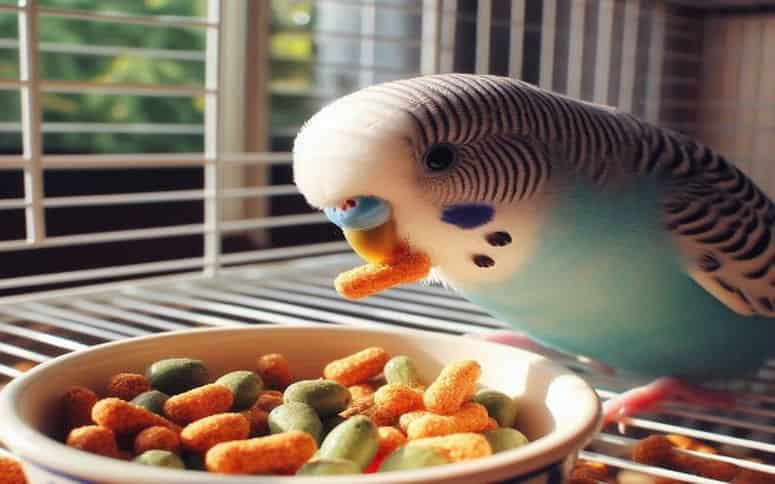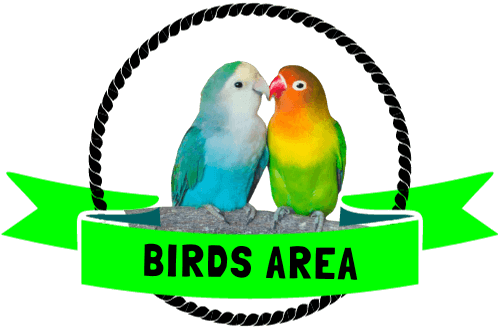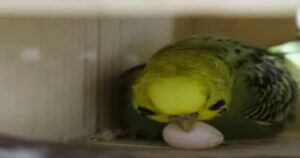Why Does My Budgie Keep Opening Its Mouth?
Welcome to our blog! Today, we’re tackling a common question: Why does my budgie keep opening its mouth? If you’ve noticed this behavior in your feathery friend, you might be wondering what’s going on.
There are several reasons, ranging from natural habits to potential health concerns. Your budgie could be yawning, regulating its temperature, or even showing signs of affection.
On the other hand, it might also be reacting to allergens or respiratory irritants. Understanding these reasons can help you ensure your budgie stays happy and healthy.
Let’s dive into each possibility and determine what’s happening with your pet budgie. Keep reading to learn more.
Why Does My Budgie Keep Opening Its Mouth? Possible Reasons

There are several reasons why a budgie (parakeet) might keep opening its mouth, and it’s essential to observe other behaviors and environmental factors to determine the cause.
Here are some possible reasons why your Budgie keeps opening its mouth.
1. Normal Respiratory Function
Before jumping to conclusions, it’s essential to know that budgies commonly open their mouths as a part of their normal respiratory function.
Unlike humans, who breathe through our noses, birds mainly breathe through the use of their air sacs, which are located in their abdomen. They have a specialized respiratory system that enables them to take in more oxygen with each breath.
One way in which budgies facilitate this process is by opening their mouths to allow for increased airflow.
2. Temperature Regulation
One possible reason for your budgie opening its mouth is to cool down. Unlike many other animals, birds cannot sweat. Panting serves as a way for them to regulate their body temperature.
3. Boredom or Attention-seeking
If your budgie is constantly opening and closing its mouth, it could indicate boredom or a desire for attention. Birds are intelligent creatures and require mental stimulation to prevent boredom.
4. Mouth Movement During Preening

Another reason why budgies open their mouths is during the grooming process, known as preening (Preening is a crucial behavior that helps budgies maintain their feathers in good condition).
As part of their grooming routine, budgies may use their beaks to clean and position their feathers. During this process, they often open their mouths wider as they adjust their feathers, creating a visually intriguing sight.
5. Illness or Respiratory Problem
An open mouth in budgies can be a sign of an illness, such as a respiratory infection. If accompanied by other symptoms like sneezing or coughing, it is advisable to consult a veterinarian.
6. Oral Health
Dental problems or mouth infections can also cause a budgie to open its mouth. Regularly inspect your budgie’s beak and mouth for any signs of inflammation, redness, or discharge.
7. Discomfort or Pain
Budgies may open their mouths as a response to discomfort or pain. However, this could be due to issues with any injury or gastrointestinal problems. A thorough examination by a veterinarian can help determine the cause.
8. Parasites and Infections
Budgies can be susceptible to internal and external parasites, such as mites or worms, which can cause discomfort and lead to mouth-opening behavior.
Regularly inspect your budgie’s feathers and skin for any signs of infestation.
9. Mimicking or Learning Behavior
Budgies are known for mimicking sounds and behaviors. If you have been talking to your budgie and it opens its mouth in response, it could be trying to imitate you or learning new vocalizations.
However, it’s essential to observe your budgie closely and consider any other accompanying symptoms or changes in behavior. If you are concerned about your budgie’s health, it’s always best to seek professional advice from a veterinarian.
What Do I Do If My Budgie Keeps Opening Its Mouth? Expert Solution

If your budgie continues to open its mouth and you’re concerned about its health, consider the following steps:
1. Provide Fresh Water
Make sure your budgie always has access to clean and fresh water. This will help ensure that they are not opening their mouths due to thirst.
2. Provide Appropriate Diet For A Healthy Budgie
An appropriate diet plays a significant role in maintaining your budgie’s overall health and well-being. Feeding your budgie a balanced and nutritious diet is crucial to prevent health issues.
Ensure their diet consists of a variety of fresh fruits, vegetables, high-quality seeds, and pellets specially formulated for budgies. Avoid feeding them sugary and fatty foods, as these can lead to obesity and other health complications.
By providing a healthy diet, you are giving your budgie the best chance at a vibrant and long life.
3. Monitor Temperature:
Check the temperature in your budgie’s environment. If it’s too hot, they may be opening their mouths to cool down. Ensure that the room where your budgie is kept is at a comfortable temperature, ideally between 65°F to 75°F (18°C to 24°C).
Consider providing a cooler area for your budgie or using a fan to regulate the temperature.
4. Rule Out Illness

If your budgie’s behavior seems abnormal or they display other symptoms of illness, such as puffiness, lethargy, or a change in appetite, it’s crucial to consult with a veterinarian. They can assess your budgie’s health and provide proper treatment if necessary.
5. Reduce Stress
Budgies can open their mouths when they’re stressed or anxious. Create a calm and quiet environment for your budgie by minimizing loud noises, sudden movements, and harsh lighting.
Provide them with toys, perches, and a stimulating environment to keep them entertained and alleviate stress.
6. Offer A Comfortable Environment
Make sure your budgie’s cage is spacious enough for them to move around comfortably.
7. Don’t Force Interaction
If your budgie is opening its mouth when you try to interact with it, it may be a sign that they are not comfortable or ready for social interaction. Give them time and space to adjust and build trust at their own pace.
Remember, each budgie is unique, and their behavior can vary. If you are unsure about why your budgie keeps opening its mouth or if you have concerns, consulting with an avian veterinarian is always a good idea.
They will provide you with professional advice and guidance tailored to your budgie’s specific needs.
Signs Of Concern And When To Seek Veterinary Help

If your budgie keeps opening its mouth frequently, it is essential to pay attention as it may be a sign of an underlying health issue.
While it is normal for budgies to open their mouths occasionally to cool down, persistent or excessive mouth opening can indicate a problem that requires veterinary attention.
Here are some signs of concern and when you should seek help from a veterinarian:
- Difficulty Breathing: If your budgie is struggling to breathe or wheezing, it could be a sign of a respiratory infection or an obstruction in the airways. This is a serious condition and requires immediate veterinary help.
- Change in Appetite: If your budgie’s mouth opening is accompanied by a loss of appetite or difficulty eating, it could indicate dental problems, such as a broken tooth or an abscess. Consulting a veterinarian can help identify the cause and provide appropriate treatment.
- Abnormal Noises: If your budgie makes clicking, wheezing, or gurgling sounds while opening its mouth, it could be a sign of an upper respiratory infection or a respiratory disease. Prompt veterinary attention is necessary to diagnose the condition and start appropriate treatment.
- Lethargy: If your budgie appears lethargic, inactive, or shows a lack of interest in its surroundings, it may be a sign of illness. Along with frequent mouth opening, this could indicate an infection, injury, or other underlying health issues that require professional care.
- Change in Droppings: Any noticeable changes in the color, consistency, or frequency of your budgie’s droppings should not be ignored. It could be a sign of an intestinal infection, digestive issues, or other health problems. Veterinary assistance can help identify the cause and provide necessary treatment.
Remember, as a pet owner, it’s essential to monitor your budgie’s behavior and seek veterinary help if you notice any concerning signs. Prompt medical attention can contribute to the well-being and longevity of your feathered friend.
Frequently Asked Questions For Why Does My Budgie Keep Opening Its Mouth
Why Does My Budgie Open Its Mouth Repeatedly?
How Can I Tell If My Budgie’s Mouth Opening Is A Sign Of Illness?
Why Is My Budgie Stretching His Neck And Opening His Mouth?
Why Does It Look Like My Budgie Is Gasping For Air?
Is It Normal For Budgies To Pant And Open Their Beak?
Wrap Up
If you notice your budgie frequently opening its mouth, it could be a sign that it is trying to cool down. Birds pant as a means of regulating their body temperature since they cannot sweat like other animals.
However, if you observe any other concerning symptoms or if the behavior persists, it is advisable to consult a veterinarian to rule out any underlying health issues.
Keeping a close eye on your budgie’s behavior and well-being is essential in ensuring its overall health and happiness.







